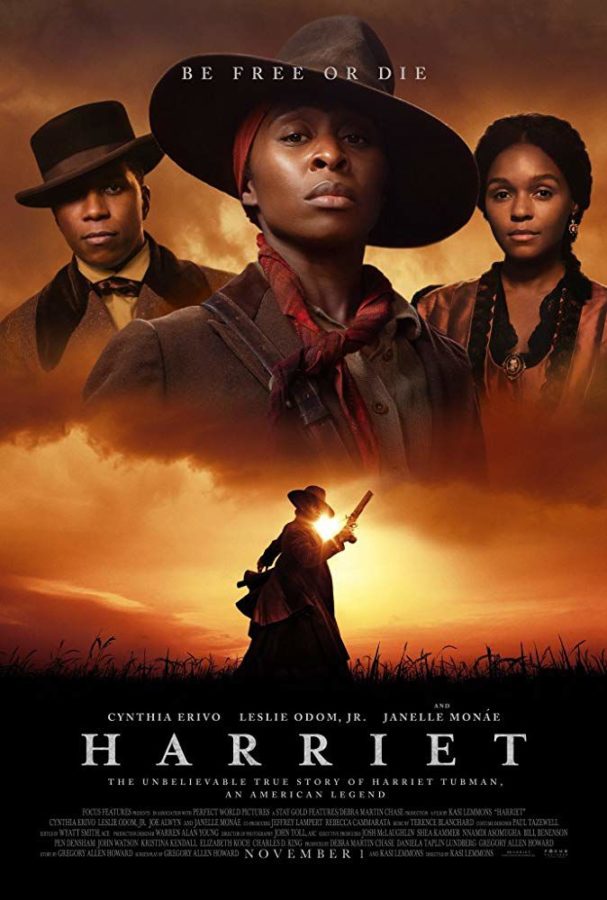Film screening of ‘Harriet’ highlights life of American heroine
In celebration of Black History Month this year, the Student Union Board is showing a screening of the biographical film, “Harriet.”
February 19, 2020
Iowa State’s Student Union Board hosted a film screening based on the iconic and inspirational life of an American freedom fighter. “Harriet” was shown last night in Carver Hall.
The planned discussion panel did not make it to the film screening, but the facilitator decided to have an open discussion and brief description of the film instead.
“I think everyone can agree that the impacts of the past and today revolve around her being a role model and inspiration to everyone as well, and she really focuses on helping us move into discussions of gender and racial [bias], and [we’ve] all been really working to break that mold,” said a speaker at the screening.
After the discussion, they proceeded with the showing.
The film highlights the struggles of African Americans during the times of slavery and how, despite all of the challenges, still fought for freedom. It brings awareness to racism and women’s rights, since those were heavily depicted during the late 1800s.
Born in 1822, Araminta “Minty” Ross Tubman and her family lived on a plantation in Dorchester County, Maryland, where they were slaves to plantation owners. Tubman had many siblings but lost them due to the harsh casualties of slavery.
Her passion for freedom came after being struck in the head from stepping in between an overseer who was getting ready to throw a heavyweight on a fugitive slave. This made a huge dent on her head and left her with headaches and narcolepsy. Due to her head trauma, she had vivid hallucinations and dreams, including receiving messages from God. Tubman was a devoted Christian and made many references towards God during her expedition to freedom.
“Seem like I learned to see and hear God like some learn to read a book,” Tubman said. “I put all my attention on it. Act without question. For I can wonder…if I even heard it at all.”
According to Harriet-Tubman.org, Tubman was nicknamed “Moses” because of the analogy of the biblical story of Moses who attempted to lead the Jews to the Promised Land and free them from slavery.
After moving to Bucktown, Maryland, in 1849, Tubman and her family went to their master, Edwin Brodess, with letters from a lawyer to become free, since Brodess promised her that she would be free when her parents turned 45, but her master broke his promise and refused to let her free.
After Brodess died, his son, Gideon Brodess, put Tubman up for sale. This was when Tubman decided to escape. She said goodbye to her loved ones and started her expedition to escape slavery for a better life. She met up with her father who was free, and her father guided her to the church to get prayers from a pastor.
Everyone was afraid for her journey since she was highly wanted. The pastor told her to follow the North Star. This would guide her to the nearest river in Delaware, which would take her to Pennsylvania to meet up with William Still, a blacksmith.
Tubman made it to Pennsylvania safely and met up with Still. The blacksmith kept a record of of slaves that escaped from slavery to have a better life in Pennsylvania and asked for Tubman’s name. She decided to keep her mother’s name “Harriet” and her husband’s last name, “Tubman.”
Still introduced Tubman to Marie Buchanan, who was the owner of a boarding house for free slaves. While she was at the boarding house, she was missing her husband and her family and wanted to go back to free them.
“I made it this far on my own,” Tubman said. “God was watching, but my feet were my own. Running, bleeding, climbing, nearly drowned, nothing to eat for days and days, but I made it.”
Tubman managed to free her family and friends, despite the challenges that she had to face.
“Later in 1863, two years into the Civil War, Tubman [led] a raid that [freed] 750 slaves,” according to IMDb.com. “She [returned] home to Canada, where she [lived] with most of her family that she rescued, a free woman.”
Tubman had a lot of impact on the Civil War. According to History.org, she was recruited to assist fugitive slaves at Fort Monroe, where she used her knowledge of herbal medicines to help treat sick soldiers and fugitive slaves. Tubman also provided crucial intelligence to Union commanders about Confederate Army supply routes and troops and helped liberate slaves to form black Union regiments.
“Slavery is still alive,” Tubman said in the film. “Those rice fields downriver are feeding rebel troops with the toil of a thousand slaves still in bondage. Our mission is to free those slaves. We’ve waited years to be allowed to fight in this war against our own enslavement, and it will not be won without us. Now is our time. You ready to kill the snake?”






